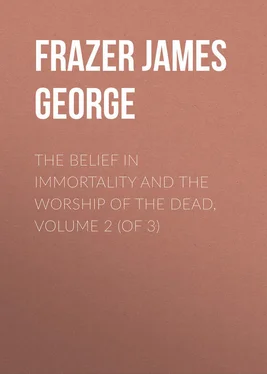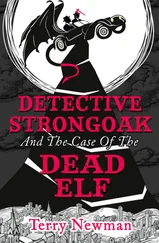James Frazer - The Belief in Immortality and the Worship of the Dead, Volume 2 (of 3)
Здесь есть возможность читать онлайн «James Frazer - The Belief in Immortality and the Worship of the Dead, Volume 2 (of 3)» — ознакомительный отрывок электронной книги совершенно бесплатно, а после прочтения отрывка купить полную версию. В некоторых случаях можно слушать аудио, скачать через торрент в формате fb2 и присутствует краткое содержание. Жанр: foreign_antique, foreign_prose, на английском языке. Описание произведения, (предисловие) а так же отзывы посетителей доступны на портале библиотеки ЛибКат.
- Название:The Belief in Immortality and the Worship of the Dead, Volume 2 (of 3)
- Автор:
- Жанр:
- Год:неизвестен
- ISBN:нет данных
- Рейтинг книги:3 / 5. Голосов: 1
-
Избранное:Добавить в избранное
- Отзывы:
-
Ваша оценка:
- 60
- 1
- 2
- 3
- 4
- 5
The Belief in Immortality and the Worship of the Dead, Volume 2 (of 3): краткое содержание, описание и аннотация
Предлагаем к чтению аннотацию, описание, краткое содержание или предисловие (зависит от того, что написал сам автор книги «The Belief in Immortality and the Worship of the Dead, Volume 2 (of 3)»). Если вы не нашли необходимую информацию о книге — напишите в комментариях, мы постараемся отыскать её.
The Belief in Immortality and the Worship of the Dead, Volume 2 (of 3) — читать онлайн ознакомительный отрывок
Ниже представлен текст книги, разбитый по страницам. Система сохранения места последней прочитанной страницы, позволяет с удобством читать онлайн бесплатно книгу «The Belief in Immortality and the Worship of the Dead, Volume 2 (of 3)», без необходимости каждый раз заново искать на чём Вы остановились. Поставьте закладку, и сможете в любой момент перейти на страницу, на которой закончили чтение.
Интервал:
Закладка:
"After sitting here some time, and distributing some presents to those about us, we signified our desire to see the country. The chief immediately took the hint, and conducted us along a lane that led to an open green, on the one side of which was a house of worship built on a mount that had been raised by the hand of man, about sixteen or eighteen feet above the common level. It had an oblong figure, and was inclosed by a wall or parapet of stone, about three feet in height. From this wall the mount rose with a gentle slope, and was covered with a green turf. On the top of it stood the house, which had the same figure as the mount, about twenty feet in length, and fourteen or sixteen broad. As soon as we came before the place, every one seated himself on the green, about fifty or sixty yards from the front of the house. Presently came three elderly men; who seated themselves between us and it, and began a speech, which I understood to be a prayer, it being wholly directed to the house. This lasted about ten minutes; and then the priests, for such I took them to be, came and sat down along with us, when we made them presents of such things as were about us. Having then made signs to them that we wanted to view the premises, my friend Attago immediately got up, and going with us, without showing the least backwardness, gave us full liberty to examine every part of it.
"In the front were two stone steps leading to the top of the wall; from this the ascent to the house was easy, round which was a fine gravel walk. The house was built, in all respects, like to their common dwelling-houses; that is, with posts and rafters; and covered with palm thatch. The eaves came down within about three feet of the ground, which space was filled up with strong matting made of palm leaves, as a wall. The floor of the house was laid with fine gravel; except in the middle, where there was an oblong square of blue pebbles, raised about six inches higher than the floor. At one corner of the house stood an image rudely carved in wood, and on one side lay another; each about two feet in length. I, who had no intention to offend either them or their gods, did not so much as touch them, but asked Attago, as well as I could, if they were Eatuas , or gods. Whether he understood me or no, I cannot say; but he immediately turned them over and over, in as rough a manner as he would have done any other log of wood, which convinced me that they were not there as representatives of the Divinity. I was curious to know if the dead were interred there, and asked Attago several questions relative thereto; but I was not sure that he understood me; at least I did not understand the answers he made, well enough to satisfy my inquiries. For the reader must know, that at our first coming among these people, we hardly could understand a word they said. Even my Otaheitean youth, and the man on board the Adventure , were equally at a loss: but more of this by and by. Before we quitted the house we thought it necessary to make an offering at the altar. Accordingly we laid down upon the blue pebbles, some medals, nails, and several other things; which we had no sooner done than my friend Attago took them up, and put them in his pocket. The stones with which the walls were made that inclosed this mount, were some of them nine or ten feet by four, and about six inches thick. It is difficult to conceive how they can cut such stones out of the coral rocks.
"This mount stood in a kind of grove open only on the side which fronted the high road, and the green on which the people were seated. At this green or open place, was a junction of five roads, two or three of which appeared to be very public ones. The groves were composed of several sorts of trees. Among others was the Etoa tree, as it is called at Otaheite, of which are made clubs, etc., and a kind of low palm, which is very common in the northern parts of New Holland.
"After we had done examining this place of worship, which in their language is called a-fiat-tou-ca , we desired to return." 262 262 Captain James Cook, Voyages , iii. 182-184.
A little farther on, still speaking of his first visit to Tonga, Captain Cook observes: "So little do we know of their religion, that I hardly dare mention it. The buildings called afiatoucas , before mentioned, are undoubtedly set apart for this purpose. Some of our gentlemen were of opinion, that they were merely burying-places. I can only say, from my own knowledge, that they are places to which particular persons directed set speeches, which I understood to be prayers, as hath been already related. Joining my opinion with that of others, I was inclined to think that they are set apart to be both temples and burying-places, as at Otaheite, or even in Europe. But I have no idea of the images being idols; not only from what I saw myself, but from Mr. Wales's informing me that they set one of them up, for him and others to shoot at." 263 263 Captain James Cook, op. cit. iii. 206.
Thus Captain Cook and his party were divided in opinion as to whether the house on the mound, within its walled enclosure built of great stones, was a temple or a tomb. Captain Cook himself called it simply a "house of worship" and a "place of worship," but he inclined to the view that it was both a temple and a burying-place, and in this opinion he was probably right. The native name which he applied to it, afiatouca , means a burial-place; for it is doubtless equivalent to fytoca , a word which Mariner explains to mean "a burying-place, including the grave, the mount in which it is sunk, and a sort of shed over it." 264 264 W. Mariner, Tonga Islands , i. 144, note *. However, in another passage (i. 392, note *) Mariner tells us that, strictly speaking, the word fytoca applied only to the mound with the grave in it, and not to the house upon the mound; for there were several fytocas that had no houses on them. For other mentions of fytocas and notices of them by Mariner, see op. cit. i. pp. 386, note *, 387, 388, 392, 393, 394, 395, 402, ii. 214-218.
Moreover, the oblong square of blue pebbles, which Captain Cook observed on the floor of the house on the mound, and which he regarded as the altar, speaks also in favour of the house being a tomb; for Mariner has described how the mourners brought white and black pebbles to the house which stood over the grave of King Finow, and how they "strewed the inside of the house with the white ones, and also the outside about the fytoca , as a decoration to it: the black pebbles they strewed only upon those white ones, which covered the ground directly over the body, to about the length and breadth of a man, in the form of a very eccentric ellipse. After this, the house over the fytoca ," continues Mariner, "was closed up at both ends with a reed fencing, reaching from the eaves to the ground, and, at the front and back, with a sort of basket-work, made of the young branches of the cocoa-nut tree, split and interwoven in a very curious and ornamental way, to remain till the next burial, when they are to be taken down, and, after the conclusion of the ceremony, new ones are to be put up in like manner." 265 265 W. Mariner, Tonga Islands , i. 402. A little farther on (p. 424, note *) Mariner remarks that "mourners were accustomed to smooth the graves of their departed friends, and cover them with black and white pebbles."
This description of the house over King Finow's grave agrees so closely with Captain Cook's description of the house in the afiatouca , that we may with much probability regard the latter as a tomb, and suppose that the "oblong square of blue pebbles," which Cook regarded as an altar and on which he laid down his offering, marked the place of the body in the grave: it was at once an altar and a tombstone.
Интервал:
Закладка:
Похожие книги на «The Belief in Immortality and the Worship of the Dead, Volume 2 (of 3)»
Представляем Вашему вниманию похожие книги на «The Belief in Immortality and the Worship of the Dead, Volume 2 (of 3)» списком для выбора. Мы отобрали схожую по названию и смыслу литературу в надежде предоставить читателям больше вариантов отыскать новые, интересные, ещё непрочитанные произведения.
Обсуждение, отзывы о книге «The Belief in Immortality and the Worship of the Dead, Volume 2 (of 3)» и просто собственные мнения читателей. Оставьте ваши комментарии, напишите, что Вы думаете о произведении, его смысле или главных героях. Укажите что конкретно понравилось, а что нет, и почему Вы так считаете.











